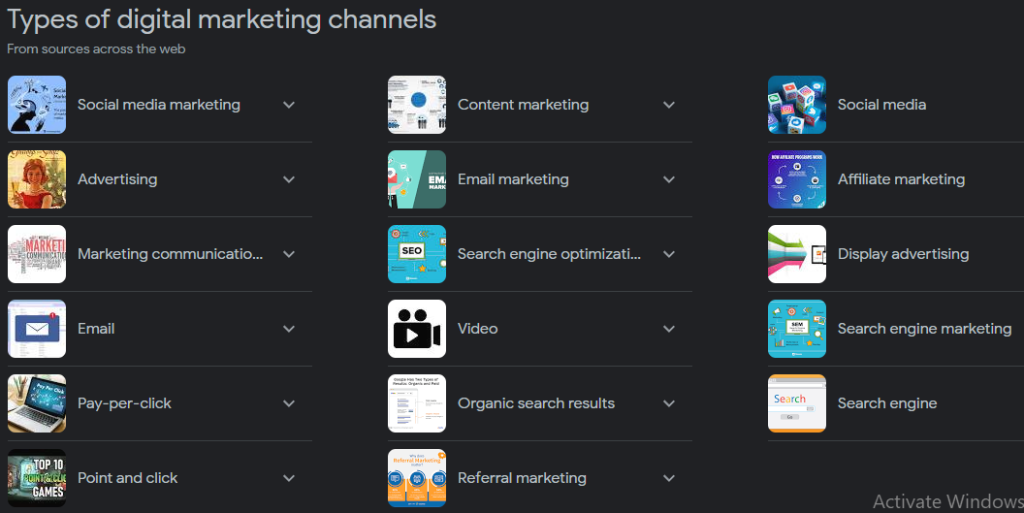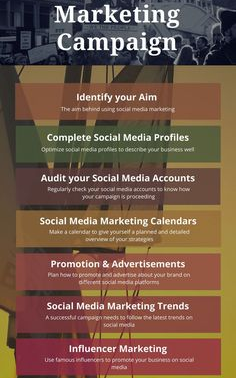
What is Digital Marketing?

Digital marketing refers to the use of electronic devices for conveying promotional messages and measuring their impact throughout the customer journey. It encompasses various forms, including online video, display ads, search engine marketing, paid social ads, and social media posts, in contrast to traditional marketing methods like magazine ads and billboards. More than 75% of Americans go online daily, with a significant portion being online frequently, making it crucial for marketers to establish a strong online presence. Digital marketing strategies involve utilizing channels like social media, pay-per-click, SEO, and email marketing to connect with existing and potential customers, build brand recognition, enhance the customer experience, and attract new prospects.

What is a Digital Marketing channel?
These platforms serve as essential tools for businesses to connect with their target audience, deliver information, address customer inquiries, and work towards achieving their marketing goals. Digital marketing channels enable businesses to establish an online presence, engage with customers, and effectively promote their products or services in the digital landscape. When used strategically, these channels can contribute to building brand recognition, nurturing customer relationships, and ultimately driving success in the online marketplace.
How many types of digital marketing channels?

Search Engine Optimization (SEO): SEO is a vital component of digital marketing. It involves optimizing a website or online content to improve its visibility on search engines, particularly Google. This is crucial because search engines are a primary source of online traffic, with billions of searches conducted every day. By employing effective SEO strategies, digital marketers can enhance a website’s ranking in search results, driving more organic traffic and potential customers. This can lead to increased brand visibility, credibility, and conversions. Key SEO practices for digital marketing include keyword research, on-page optimization, content creation, and link building. Overall, SEO is a fundamental aspect of any successful digital marketing strategy.
Content Marketing: Content marketing is a strategic approach in digital marketing that focuses on creating and distributing valuable, relevant, and consistent content to attract and engage a target audience. The primary goal of content marketing is to provide information, entertainment, or solutions to the audience, ultimately building trust, brand authority, and loyalty. Effective content marketing involves understanding the target audience, creating high-quality content, optimizing it for search engines, and promoting it through various channels. It can encompass various content types, including blog posts, articles, videos, infographics, social media posts, and more. Content marketing is a long-term strategy that aims to drive organic traffic, generate leads, and foster customer relationships, making it a crucial element of modern digital marketing efforts.
Social Media Marketing: Social Media Marketing is a digital marketing strategy that focuses on leveraging social media platforms to connect with and engage a target audience. It involves creating and sharing content on social media channels to build brand awareness, drive website traffic, and achieve marketing goals. This marketing approach encompasses various activities, including posting text, images, videos, and interactive content, as well as engaging with the audience through comments and messages. Social Media Marketing aims to enhance brand visibility, foster community, and interact with customers in a more personalized way. It’s a valuable tool for businesses to reach and influence their target audience, generate leads, and build brand loyalty in the digital age.
Email Marketing:Email marketing is a digital marketing strategy that involves sending targeted and personalized email messages to a group of recipients, often subscribers or customers. The primary goals of email marketing are to nurture relationships with the audience, promote products or services, and drive engagement and conversions. This strategy can include various types of emails, such as newsletters, promotional offers, transactional emails, and more. Email marketing relies on collecting and managing email lists, segmenting the audience, creating compelling content, and optimizing for deliverability and engagement. It’s a cost-effective and powerful tool for businesses to communicate with their audience, provide valuable information, and drive sales and customer loyalty through a direct and personalized channel.
Pay-Per-Click (PPC) Advertising: Pay-Per-Click (PPC) advertising is a digital marketing model where advertisers pay a fee each time their ad is clicked. It’s typically used on search engines like Google or on social media platforms. Advertisers bid on keywords or target specific demographics to have their ads displayed to relevant users. PPC campaigns are highly controllable and measurable, offering real-time insights into ad performance. They can be an effective way to drive immediate traffic to a website or landing page and can be a valuable tool for businesses looking to generate leads, increase brand visibility, and achieve specific marketing objectives.
Display Advertising: Display advertising is a digital marketing strategy that involves creating and placing visual or multimedia ads on websites, apps, or social media platforms. These ads can take various forms, such as banners, images, videos, or interactive content. Display advertising is designed to capture the attention of online users and promote a brand, product, or service. Advertisers often use targeting options to reach a specific audience based on factors like demographics, interests, or browsing behavior. This approach is commonly used to increase brand awareness, drive website traffic, and support other marketing objectives. Display advertising offers a wide reach and can be a valuable part of a comprehensive digital marketing campaign.
Affiliate Marketing: Affiliate marketing is a digital marketing strategy where individuals or businesses, known as affiliates, promote the products or services of other companies in exchange for a commission. Affiliates use various online channels to drive traffic and sales to the merchant’s website, and they are compensated based on agreed-upon models, such as pay-per-sale or pay-per-click. This performance-based marketing approach benefits both businesses, as it helps expand their reach and customer base, and affiliates, who can earn income by promoting products or services they support. Affiliate marketing has become a significant and widely used strategy in the digital marketing landscape.
Influencer Marketing: Affiliate marketing is a digital marketing strategy where individuals or businesses, known as affiliates, promote the products or services of other companies in exchange for a commission. Affiliates use various online channels to drive traffic and sales to the merchant’s website, and they are compensated based on agreed-upon models, such as pay-per-sale or pay-per-click. This performance-based marketing approach benefits both businesses, as it helps expand their reach and customer base, and affiliates, who can earn income by promoting products or services they support. Affiliate marketing has become a significant and widely used strategy in the digital marketing landscape.
Mobile Marketing: Mobile marketing is a digital marketing strategy that focuses on reaching and engaging audiences through mobile devices, such as smartphones and tablets. It encompasses a wide range of tactics, including mobile apps, mobile-optimized websites, SMS marketing, in-app advertising, location-based marketing, and mobile search advertising. The key objective of mobile marketing is to connect with consumers on their mobile devices, offering personalized and location-aware content and promotions. As mobile device usage continues to grow, mobile marketing has become a vital component of any comprehensive digital marketing strategy, enabling businesses to reach a broad and highly engaged audience.
Video Marketing:Video marketing is a digital marketing strategy that involves creating and sharing videos to engage, inform, and convert an audience. It is used on various online platforms, such as websites, social media, and video-sharing sites like YouTube. Video marketing is a powerful tool for businesses to convey their message, showcase products or services, and connect with their audience in a visually engaging and memorable way. It can support various marketing objectives, including brand awareness, lead generation, and sales. As online video consumption continues to grow, video marketing has become a prominent and effective component of modern digital marketing strategies.
Remarketing/Retargeting: Remarketing or retargeting is a digital marketing strategy that focuses on re-engaging users who have previously visited a website or interacted with a brand but didn’t complete a desired action, such as making a purchase. This approach uses tracking technologies like cookies to identify these past visitors and deliver targeted ads to them as they browse other websites or use online platforms. The goal of remarketing is to remind and persuade these potential customers to return to the website and complete the desired action. It’s a valuable strategy to boost conversions, improve brand recall, and enhance the overall effectiveness of digital marketing campaigns by targeting a warm audience that has shown prior interest.
Chatbots and Messaging Apps: Chatbots and messaging apps are a digital marketing and customer service strategy that uses automated conversational agents to interact with users through messaging platforms and websites. These AI-powered bots provide real-time communication, offer customer support, assist with tasks, and can even be used for marketing and sales purposes. They operate on popular messaging apps and websites, providing efficiency, scalability, and personalization, while also collecting valuable user data. Chatbots and messaging apps have become essential tools for businesses to enhance customer engagement, improve service, and drive sales in the digital age.
Social Media Groups and Communities: Social media groups and communities for digital marketing channels are online spaces within social networking platforms where professionals, marketers, and enthusiasts gather to discuss and share insights, trends, and best practices related to digital marketing. These groups serve as valuable resources for those in the digital marketing industry by offering:

- Knowledge Sharing: Members discuss and share the latest digital marketing strategies, techniques, and tools, helping each other stay updated on industry trends.
- Networking: Professionals can connect with peers, potential clients, and collaborators, fostering valuable relationships within the digital marketing community.
- Problem-Solving: Groups provide a platform for seeking solutions to challenges and receiving advice on various aspects of digital marketing, from SEO to social media advertising.
- Collaboration: Members often find opportunities to collaborate on projects, share content, or promote each other’s work.
- Resource Sharing: Useful resources, such as articles, webinars, and case studies, are frequently shared, aiding in professional development.
- Feedback and Critique: Marketers can seek feedback on their campaigns, content, or strategies from the group, gaining valuable insights.
- Industry Updates: Group members often share and discuss industry news and changes in digital marketing platforms and algorithms.
Local SEO and Listings: Local SEO and listings are digital marketing strategies that focus on improving a business’s visibility in local search results, particularly on search engines like Google. These tactics are essential for businesses that operate locally and want to attract nearby customers. Key elements include optimizing Google My Business listings, ensuring consistency in business information across online directories, using local keywords, managing online reviews, and listing on relevant local directories. By implementing these strategies, businesses can enhance their online presence within their local communities, attract local customers, and drive foot traffic to physical locations, ultimately boosting their revenue.
Webinars and Online Events: Webinars and online events are digital marketing strategies that involve hosting interactive online presentations, workshops, or seminars. They serve as platforms for businesses to engage with their audience, deliver valuable content, generate leads, and build brand authority. These events offer global reach, encourage interaction and networking, and provide data for marketing analysis. Additionally, recorded webinars can be repurposed for ongoing content use, making them versatile tools for digital marketing. Webinars and online events allow businesses to connect with their target audience in real-time, fostering education, engagement, and relationship-building while showcasing their expertise.
Podcast Marketing: Podcast marketing is a digital marketing strategy that involves creating and promoting audio content in the form of podcasts. These podcasts cover a variety of topics and are accessible through online platforms. They serve as a medium for delivering valuable content, engaging with audiences through spoken word, and building brand authority. Podcasts offer versatility and the opportunity to reach a dedicated subscriber base, and they can also be leveraged for advertising and sponsorships. This strategy enables businesses to connect with their target audience on a personal level and build brand recognition through engaging and informative audio content.
